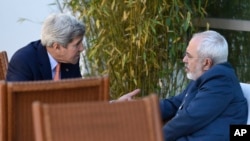Swiss authorities have searched a house in Geneva and seized computer material in connection with a possible cyberattack on nuclear negotiations between Iran and major powers in the city, Switzerland's attorney-general said on Thursday.
A computer virus was used to hack into locations including three luxury hotels that have hosted negotiations between Iran and six world powers, the Russian computer security company Kaspersky Lab said on Wednesday.
"On 12 May 2015, a house search took place in Geneva and IT hardware as well as software was seized. The aim of the aforementioned house search was to seize respective information as well as the malware; it was of particular interest to investigate whether the malware infected the respective IT systems," the Swiss attorney-general's office in Berne said in a statement.
Criminal proceedings have been opened against unknown persons "on suspicion of political espionage", it added without elaborating. A spokesman declined to give any further information on the investigation.
Meanwhile, Austrian authorities are investigating reported cyberattacks on venues linked to international talks on Iran's nuclear program, the government said on Thursday.
A computer virus was used to hack into sites including three luxury hotels that have hosted negotiations between Iran and six world powers, Kaspersky Lab said on Wednesday.
"The Federal Office for the Protection of the Constitution and Counterterrorism is aware of the information and is reviewing it," an interior ministry spokesman in Vienna said.
He declined to give more details about which locations were under review. The talks have been held in Vienna, Geneva, Lausanne, Montreux and Munich.
"You know that there are enemies of these talks and they will do whatever they can, so it's not a surprise to us," Reza Najafi, Iran's ambassador to the U.N. nuclear agency, told reporters in Vienna.
"We continue to take precautionary measures not to let any details of the discussion go to the public," he added on the sidelines of an International Atomic Energy Agency board meeting. "I should say we have been successful in that regard... Of course there are some cases, which are just incidents."
Israel, Iran's arch-enemy and a strong critic of the big powers' diplomacy with Tehran, on Thursday dismissed as baseless reports that it may have had a connection to the computer virus.
Both Kaspersky and U.S. security company Symantec said the virus shared some programming with previously discovered espionage software called Duqu, which security experts believe to have been developed by Israelis.
Israel, widely believed to be the Middle East's only nuclear power, has denounced the negotiations with Iran, saying it doubts any agreement arising from the talks will sufficiently restrain the Islamic Republic's atomic program.





